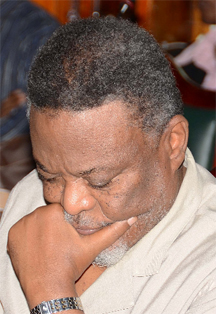APNU and the AFC last evening used their combined parliamentary majority to move the four service commissions towards financial independence.
The Service Commissions motion, which was moved by Shadow Finance Minister and APNU MP Carl Greenidge, was approved without the support of the government, which argued that the process should be directed through constitutional reform.
The motion is intended to allow the Judicial, Public, Teaching and Police service commissions to each draw finances directly from the Consolidated Fund—rather than be maintained as budget agencies, which compromises their independent functioning, according to opposition MPs.

Opposition MPs argued yesterday that the move will result in the service commissions being more effective in their respective mandates, which include appointments to offices in the judiciary, the public service, the teaching service and the police force, and exercising disciplinary control over appointees.
Greenidge told the National Assembly that the opposition had not arrived at an agreement with the government on the service commissions, while noting that he had raised the importance of the commissions being able to function independently.
The motion calls for the National Assembly to take steps as early as possible to replace the Third Schedule of Article 222A of the Constitution, which does not include the service commissions among those entities with financial autonomy. It also enjoins the National Assembly to treat the commissions as autonomous bodies drawing directly from the Consolidated Fund, while requiring that the change be reflected in the annual estimates submitted by the Finance Minister.
But Prime Minister Samuel Hinds stated that the government would not contest that the commissions needed to be reformed, while admitting that there may have been oversight that resulted in them not being listed among entities given financial autonomy.
However, placing the commissions on the schedule of budget agencies was not unlawful, Hinds added. He also pointed out that to achieve what the opposition proposed in the motion would require constitutional reform, which had been agreed by APNU and government during budget talks earlier in the year.
As a result, he proposed amending the motion to acknowledge that the government’s actions have been lawful and to refer the issue to the National Assembly’s Standing Committee on Constitutional Reform. But there was no support for Hinds’ amendments.
Hinds had also sought to delete a clause in the motion affirming that “continued maintenance” of the commissions in the list of budget agencies “seriously compromises their independence in the discharge of their functions.”
Opposition Leader and APNU head David Granger noted that over the years there have been situations where public servants would resign from the public service one month, and be appointed to such positions the following month—a reference to the period leading up to last November’s elections where several high ranking public officials resigned to campaign for the government during the elections period then resumed their positions afterward. Effective governance can only be achieved by an efficient police, public, and teaching service as well as an effective judiciary, he, however, emphasised. “This cannot be achieved by bypassing these services,” he stated. ”The damage has been done over the past decade through attempts to circumvent the public services and their practices which have been enshrined in the constitution,” he added.
Granger referred to the four service commissions as watchdogs of responsibility, saying they are responsible for safeguarding the integrity, impartiality and the independence of the four services. “But we have seen particularly over the past 13 years… the proliferation of contract employees, persons employed without advertising, without scrutiny,” he said. “We have seen political advisors in disguise… [and] permanent secretaries moving from political platforms to boardrooms,” he added, saying that public servants were as a result no longer professionals and were subject to the executive.
“We have seen, Mr Speaker, the growth of cronyism in the army of advisors that has sprung up in certain ministries and particularly the Office of the President… we have seen the growth of contract employees devised to undermine the Guyana Public Service Union, which ends up undermining the public service itself,” Granger observed.
Meanwhile, AFC Chair-man and MP Khemraj Ramjattan stated that nothing was preventing or prohibiting the move to make the bodies independent administrative financial bodies, although they were not included among entities under Article 222A. “What is being sought is that parliament treat the commissions as autonomous bodies, as those stated in the constitution,” he, however, added, while supporting the motion.
“We have people who behave politically heading these commissions,” Ramjattan said, adding that apart from the appointee being political, the persons who are to be protected or assisted by the commissions are left in the cold. He cited the case of Assistant Police Commissioner David Ramnarine and he noted that the Police Service Commis-sion did not come to Ramnarine’s assistance.
“They just remain dumb… why they remain dumb is because they do not have the administrative independence that this motion seeks to give them,” he said, adding that there was no need to delay the process to take it to the Committee on Constitutional Reform.








